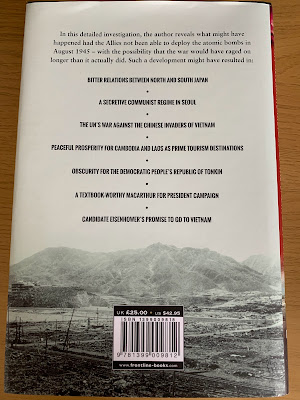I have always enjoyed a good counter-factual story and, when it comes to military history, there have been some corkers - although I leave "For Want of a Nail" out of that list just because it is simply too dry for me. In one sense though, that is a good example to pick (along with Third World War by General Sir John Hackett) in that both books position themselves as historical works published after the events they portray. The First Atomic Bomb does the same thing here, pivoting from actual history at the point of the first nuclear bomb test.
What follows is a well told tale (if sometimes a little dryly - maybe the author is a fan of For Want of a Nail?) where events may or may not diverge as far as you think they would. Here, the Soviets invade Japan, Korea is not divided and, well, you'll need to read the book to find out the rest. The Cold War still plays out, but with different locations and sometimes different players, and certainly with different outcomes, given what we know happened in South East Asia following the end of the Second World War.
It is sometimes just a case of changing the name of the country affected by a specific political dogma yet the results seems to be awfully familiar. There again, certain political processes lend themselves to failure (certainly when combined with human nature) and more than a few recognisable names pop up here and there to move things along.
Of course, the main question raised by any counter-factual should be "is it realistically possible for these events to have occurred?" and it's a good question to ask. Given the scale of the narration and the more strategic level of detail, I would say yes, it's quite plausible. After all, whilst events may hinge upon the decision of an individual or two at very specific moments, situations tend to develop at a rate often takes that decision making process (and effect) away from those concerned. I think the author here has taken a valid approach and as he has written a previous book (that one asking what if the atomic bomb had been developed early), I think I will have to pick that book up in the future.
 |
| Whoops, SPOILERS! |
It is clear that a lot of research has taken place to give the right level of authenticity to the alternate past despite what seems to be the almost inevitable status quo at the turn of the 21st Century having been achieved in this timeline too. There are plenty of photographs which are re-purposed to fit the narrative, but in a nice touch, they are also described in detail for what they actually show. Kudos for that.
For me, this was an entertaining read, and one that put a spotlight on an area that I hadn't seen covered in much detail before in counter-factual history. If this sounds like something for you, The First Atomic Bomb can pick this up at all of the usual physical and online book retailers.


No comments:
Post a Comment